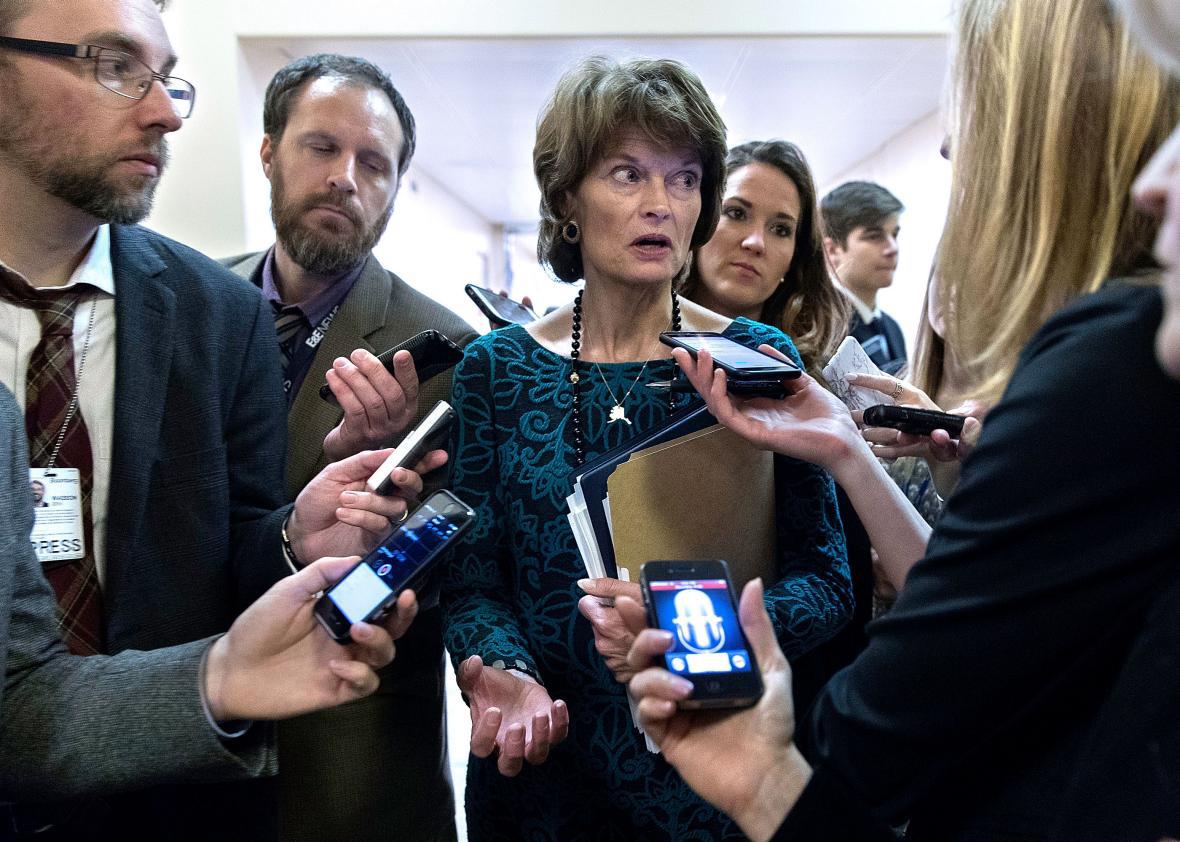Senate Republicans have been stuck on 48 or 49 votes for their last-ditch health care plan, Graham-Cassidy, since late last week. They continue to be stuck on that number Tuesday. We will know when they become unstuck when Senate leaders begin skipping down the halls, giggling like schoolchildren, to set up the vote. They have until next Saturday to get to 50, and then their ability to pass an Obamacare repeal with a simple-majority vote expires.
So far there seems to be one hard “no”: Kentucky Sen. Rand Paul, who is far more interested in broadcasting his escalating complaints about the bill to as many reporters as possible than he does in seeking some extraction. That means two of the following three holdouts would be necessary, along with all of the other 48 members of the caucus: Maine Sen. Susan Collins, Arizona Sen. John McCain, and Alaska Sen. Lisa Murkowski. These are the three that tanked the Obamacare repeal process last time, in that dramatic late July vote, but none have come out with a firm position on Graham-Cassidy yet.
Here’s how they explained their thinking Tuesday.
Susan Collins
Collins is viewed as the least likely of the three to support the bill. She’s the most moderate member of the caucus, and she came nowhere close to supporting any of the several repeal bills the Senate considered over the summer. Graham-Cassidy, which would replace the Affordable Care Act’s Medicaid expansion and subsidies with block grants allotted to states, also contains the elements of previous health care bills that most alarmed her: permission for states to gut protections for those with pre-existing conditions, per-capita spending caps on traditional Medicaid, and the defunding of Planned Parenthood.
Collins was not prepared to come out as a “no” on Tuesday. But what she’s seen of the bill, she said, “causes me great concern.” Graham-Cassidy has “many of the same flaws of the bill that we rejected previously, and in fact it has some additional flaws,” she told reporters, citing specifically the bill’s treatment of those with pre-existing conditions.
This is not a health care bill that treats Susan Collins’ vote as all that attainable.
John McCain
The pursuit of McCain’s vote is the most slapstick. About one hour after each time McCain makes his criteria known publicly, an effort to meet that criteria suddenly materializes.
On Monday morning, McCain said that the support of his governor, Doug Ducey, was of the utmost importance to him. Shortly thereafter, a tweet appeared on Ducey’s feed offering his support for the bill. It remains unclear what machinations were required to obtain Ducey’s support, since Graham-Cassidy would appear to take money from his state and retains the Medicaid cuts that made Ducey queasy over the summer.
The endorsement, though helpful, wasn’t enough to get McCain to “yes.” He insisted, again, that any bill that is to win his support must go through “regular order”: hearings, markups, amendments.
Shortly after McCain said that, both Wisconsin Sen. Ron Johnson and Utah Sen. Orrin Hatch announced that the committees they chair would hold Graham-Cassidy hearings next week. Johnson’s sudden announcement of a show health care hearing was especially cynical, since he chairs the … Homeland Security Committee. That one has since been canceled, but Hatch’s Finance Committee hearing is still on for next Monday.
The rushed hearing, which the Democratic ranking member of the committee, Oregon Sen. Ron Wyden, has called “an abomination on the history of this storied committee,” looked just a bit like a stunt put together to give McCain enough cover to claim the process met his “regular order” test.
But McCain doesn’t seem to be taking that cover.
“Do you think that that’s regular order?” he asked reporters on Tuesday. “I always thought regular order was hearings and debates and amendments, and then to the floor with debates and special amendments. That’s what I thought regular order was.”
Expect, then, leaders to set up some sort of Potemkin process of more stunt hearings, debates, amendments, floor debates, and special amendments to get McCain onboard.
Lisa Murkowski
If Collins and Paul oppose the bill, but McCain supports it, it really all comes down to Murkowski. And her vote hinges on the numbers.
“I’m still looking for the data that walks me through how Alaska actually does,” Murkowski told reporters Tuesday following the Senate Republican caucus lunch. “But I don’t have that right now. So those that have asked, ‘Where are you, where are you?’—it’s not that I’m being evasive, it’s that I’m trying to be diligent.”
She cited Alaska’s governor, Bill Walker, in insisting that additional “flexibility” for states is not nearly enough. “My governor has said ‘I like flexibility, but if I get half as much money, flexibility doesn’t help me,’ ” she said. “So, in fairness to my governor, in fairness to Alaskans, the numbers actually matter.”
Well, Walker himself seems to have looked at some numbers and determined that they are, indeed, bad. Walker, an independent, was part of a bipartisan group of 10 governors Tuesday who issued a letter opposing Graham-Cassidy.
“Our country’s Medicaid program has been in place for over 50 years,” Walker told the Fairbanks Daily News-Miner. “Any proposal to restructure Medicaid goes far beyond repealing the Affordable Care Act.” He noted that “any proposal to shift federal costs to the states would likely result in drastic cuts to our Medicaid program.”
If Murkowski is following Walker’s lead, the fate of this bill, and the future of the country’s health care systems, may well hang on what offer Republican leaders are willing to make on Alaska’s behalf in the next week.
